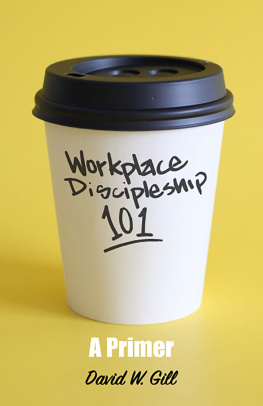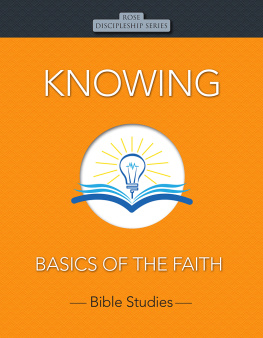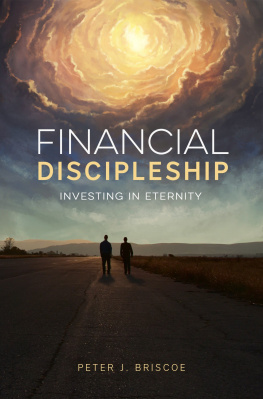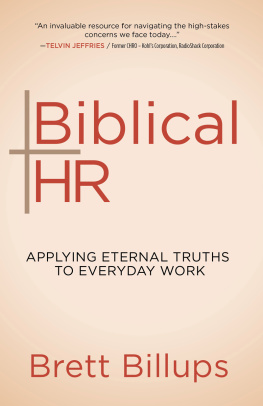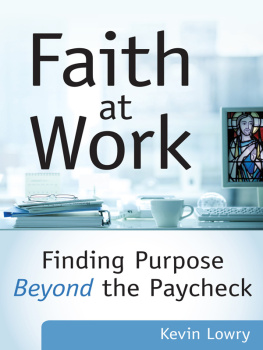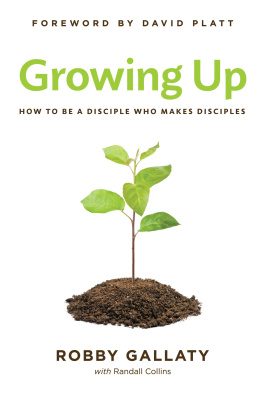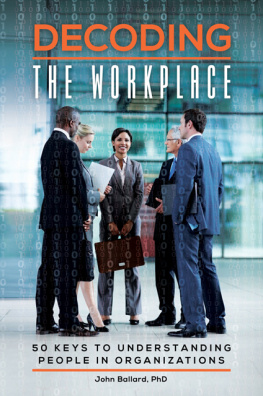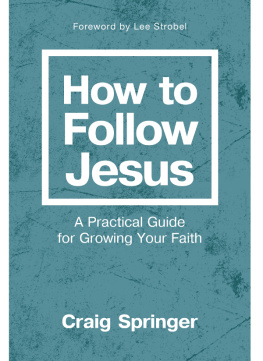Workplace Discipleship 101: A Primer (ebook edition)
2020 David Gill
Published by Hendrickson Publishers
an imprint of Hendrickson Publishing Group
Hendrickson Publishers, LLC
P. O. Box 3473
Peabody, Massachusetts 01961-3473
www.hendricksonpublishinggroup.com
ebook ISBN 978-1-68307-355-0
All rights reserved. No part of this book may be reproduced or transmitted in any form or by any means, electronic or mechanical, including photocopying, recording, or by any information storage and retrieval system, without permission in writing from the publisher.
All Scripture quotations, unless otherwise indicated, are taken from the Holy Bible, New Revised Standard Version (NRSV), copyright 1989, National Council of the Churches of Christ in the United States of America. Used by permission. All rights reserved.
Scripture quotations marked (NIV) are taken from the Holy Bible, New International Version, NIV. Copyright 1973, 1978, 1984, 2011 by Biblica, Inc. Used by permission of Zondervan. All rights reserved worldwide. www.zondervan.com. The NIV and New International Version are trademarks registered in the United States Patent and Trademark Office by Biblica, Inc.
Due to technical issues, this ebook may not contain all of the images or diagrams in the original print edition of the work. In addition, adapting the print edition to the ebook format may require some other layout and feature changes to be made.
First ebook edition September 2020
Preface
Workplace Discipleship 101 is a basic introduction to what biblical Christianity means for our work lives. While there are many books today on various aspects of this topic, we still need a primera simple, straightforward, basic, practical guide for workers. Thats what this book is. It is not an argument about economic theory or reality. It is not much about organizations (businesses, schools, factories, etc.) as such. It is about workers , men and women at work. It is a kind of curriculum, a study and action plan for Christians who really want Jesus to be Lord of their work. In school we might call it Course 101the introductionnot 201 or something more advanced or specialized.
Think about this: Christians who go into traditional pastoral or missionary callings and jobs receive lots of help and affirmation along the way. There are numerous books, training programs, and specialized schools (such as seminaries and Bible schools) that are ready and eager to train people for church ministry and work. Graduates are usually commissioned, ordained, commended, or affirmed in public ceremonies for choosing to serve God in these vocations and for completing educational programs in preparation. (For that matter, elders, deacons, and other church workers are often recognized and commissioned in church services.)
Thats all fine and good, and these folks are doing good and important work. But what is missing is for non-church-based working people to see clearly and profoundly that their work is also all about service to God. In this perspective, every Christian is involved in full-time ministrynot just pastors. Our work (whatever it may be) ought to be seen as ministry (service) to God. Remember what Paul wrote, Whatever your task, put yourselves into it, as done for the Lord and not for your masters (Col. 3:23). Thats what this little book is about: doing our work heartily for our Lord, wherever and whatever that work may be.
This book is about the workplace rather than (just) the marketplace. You may have heard of marketplace ministry and Christianity in the marketplace. But the term marketplace puts the focus on markets , on the exchange of goods and services. Of course, marketing is work, but it is only one kind of work. Work (in an accurate, inclusive sense) is a broad term. (Work, by the way, is not defined by the fact that you are paid for it. A lot of our human work is uncompensated financially, sometimes even voluntary.)
My own definition of work is as follows: effort in thought, word, and deed to provide needed and wanted products and services. It is about effort exerting ourselves to provide something that people (including ourselves) need or wantfrom the thinking and planning phase to the exertion and effort of turning those ideas into products and services. If we are not exerting ourselves, then we are resting or kicking back. Labor is a synonym for this core aspect of work. Some of our work is about making material things such as food, shelter, and equipment, but other work is providing services such as hospitality, medical, teaching, caring, organizing, or driving. Some of this exertion is in our minds as we think, analyze, and invent; some exertion is in communication (word) and some is physical (deed). Most of our work on the planet is about survival, meeting the most basic of needs. Some work is more about satisfying peoples wants, luxuries beyond mere survival.
We can understand work better by comparing it to rest and play . Rest is not-work. Rest is when we cease from our work. Play is about voluntary effort that is not about meeting needs (unless we want to say that we need to play some in this lifeto which I agree). Play can become an obligation, even a job or professionbut at that point it has become work. The distinction isnt just about being lighthearted or having funwe can experience that at work and not just while pursuing our personal hobbies and games. A key aspect of work is that we need to do it or somebody else needs us to do it. It is, however, complex: some of our work can almost feel like rest or play... and some of our attempts to rest can feel like work... and our play can evolve into work. While all three are to some extent interwoven into the reality of daily life, the distinctions are important.
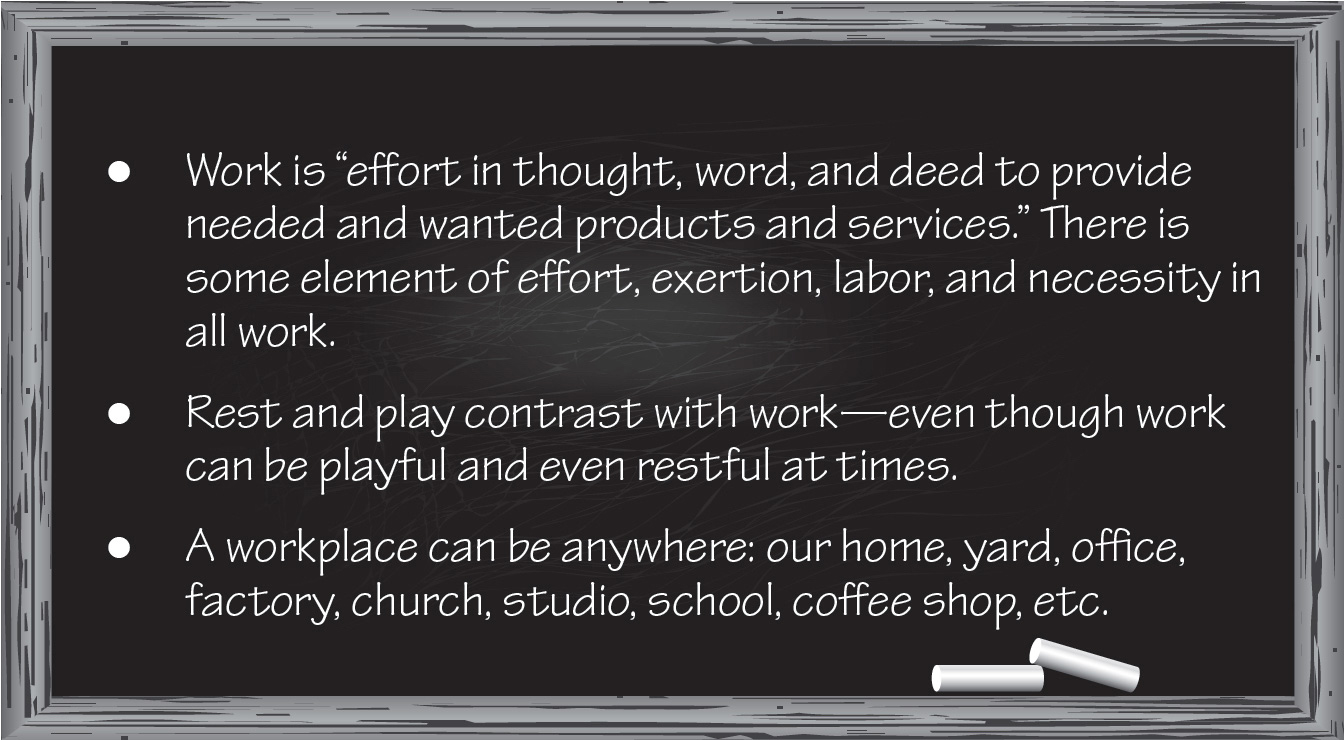
Everybody works (or should work) at all ages, whether paid or not. We are made in the image and likeness of a working God (and, we should add, a resting God). It is part of our human nature as created by God. People from every continent and nationeast and west, north and southneed to work. They need work to put food on the table and meet basic needs. But they also need to recover their dignity and meaning in life as part of their identity, made in the image and likeness of a working God. Kids should work while growing up, and retired people should take on some meaningful work even as they get old. Wherever we work (office complex, factory, home, church, campus, laboratory, studio, farm, etc.) is our workplace. One of the most misguided and insulting questions is when a mother is asked Do you work? Come on! Every mother is a working mother insists a bumper sticker.
So, the workplace is the territory, the location addressed by this book. This book is also about discipleship , which I mean in the most basic sense: learning from and following after Jesus Christ. In recent decades, you may have heard the phrase faith at work, which usually means something like the implications of the Christian faith for our work. Faith at work is a good label, but I prefer the more explicitly activist tone of workplace discipleship. By this, I mean how we think and act, how we believe and behave, as we follow Jesus as our Lord in our workplace, wherever it may be.
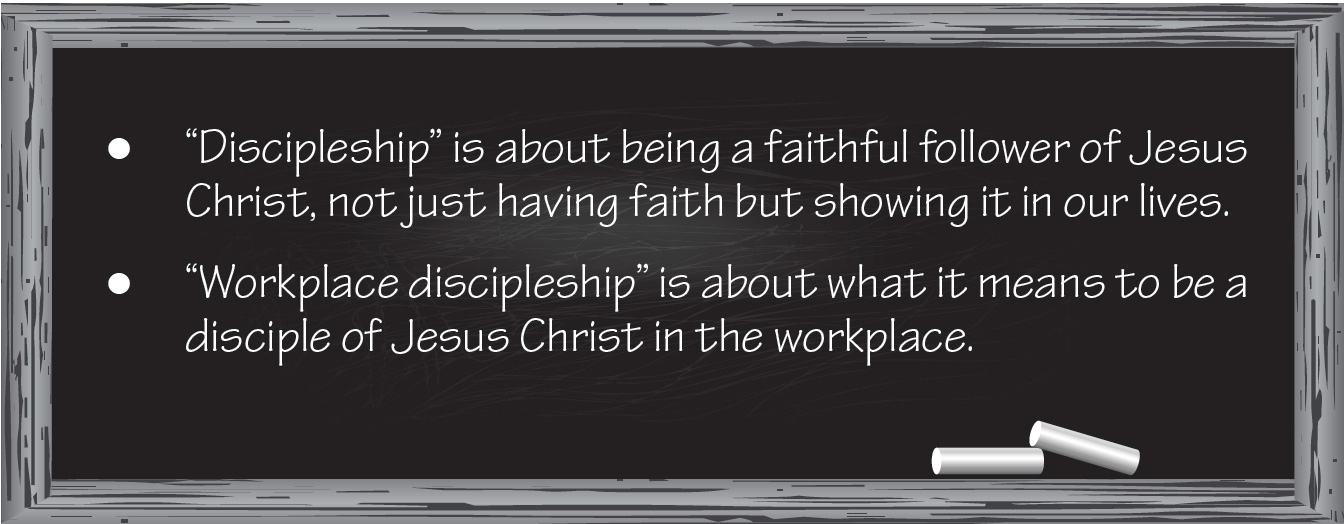
There is a ton of literature on marriage and family discipleship in the home place, and a ton on discovering our spiritual gifts for the church place. There is also a lot of help for the inner life of devotion and spiritual growth, and even some on the afterlife in a place called heaven. But workplace discipleship is often neglected. Think about this: we spend roughly one-third of our lives (eight hours of every twenty-four, if were lucky!) in bed sleeping, another one-third working, and the final one-third for everything else (family, church, recreation, etc.). That final third receives almost all of our theological attention. As for the other two-thirds, the implications are that (1) we should spare no expense in buying a good mattress (I write tongue-in-cheek, but we do spend one-third of our lives there!), and (2) we should commit to a radical upgrade of our workplace discipleship.

